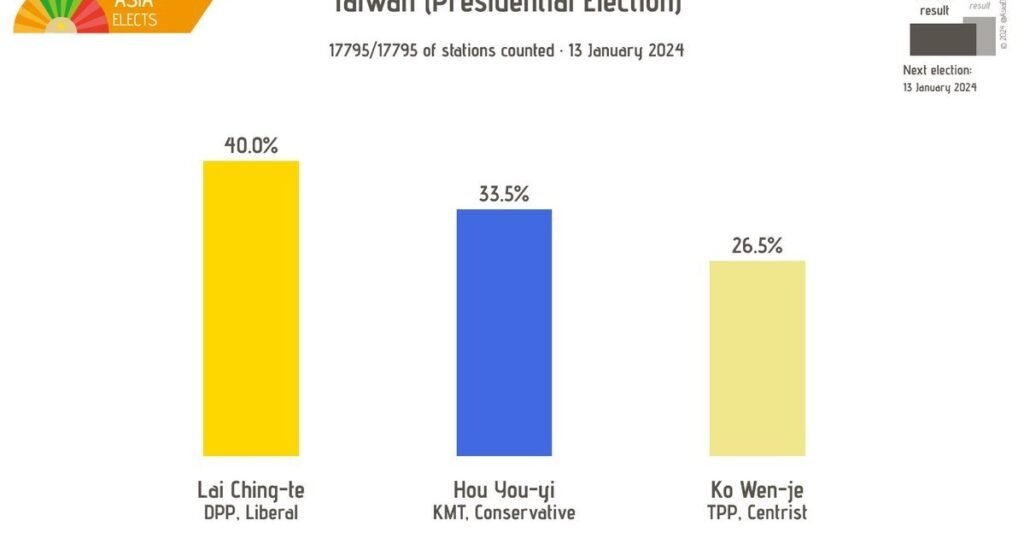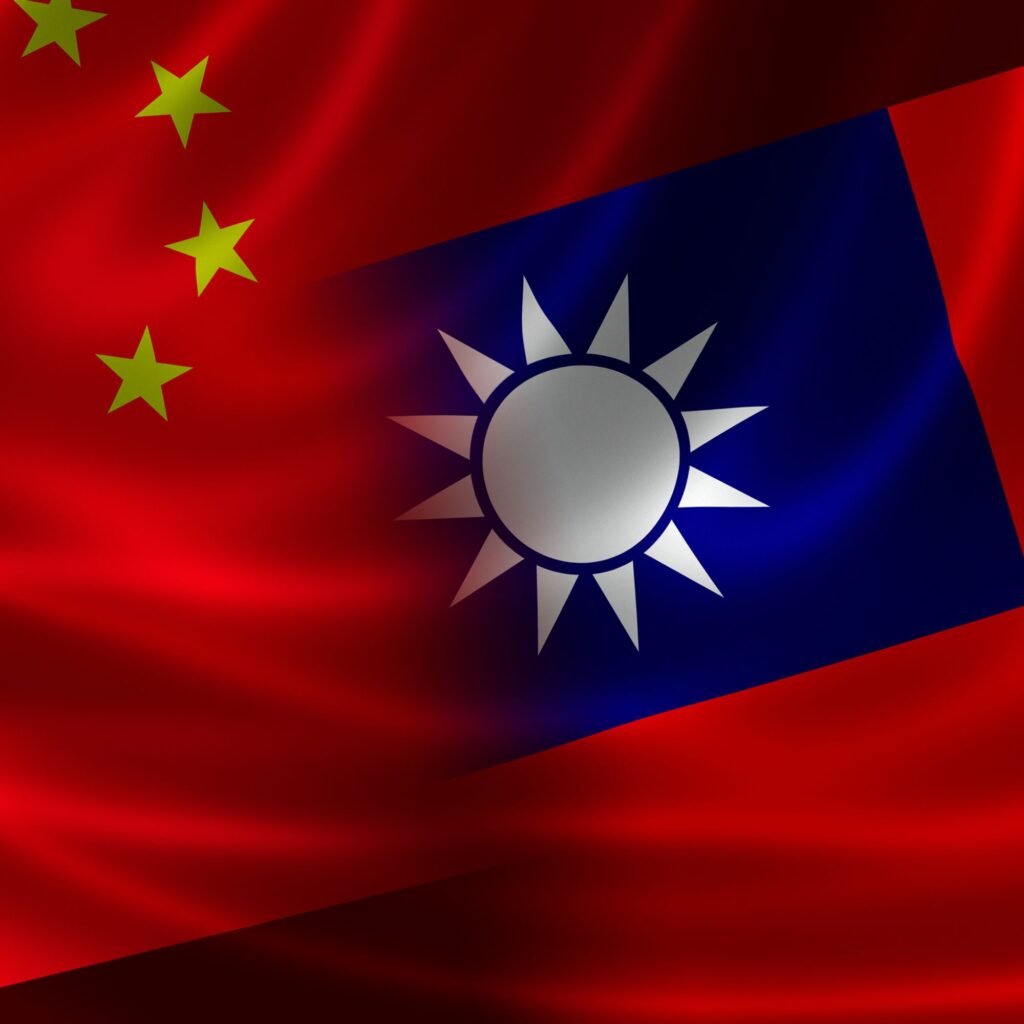Taiwan’s 2024 Elections: A Vote for Stability Amid Growing Domestic Discontent
On January 13, 2024, more than thirteen million Taiwanese took to the polls in a three-way presidential race paired with parliamentary elections. Lai Ching-te of the Democratic Progressive Party (DPP), known for its strong pro-sovereignty stance, emerged victorious with 40 percent of the vote. Although many international media outlets framed Lai’s win as a message to Beijing, closer analysis suggests that his success represents a broader desire for stability rather than a definitive shift toward independence or conflict.
However, this election revealed a less decisive mandate than previous cycles. While the DPP secured its third consecutive term, unprecedented in Taiwan’s democratic history, the domestic issues troubling voters are becoming more apparent. The rise of third-party candidate Ko Wen-je and the Taiwan People’s Party (TPP) underscores an increasing frustration with both the DPP and the Kuomintang (KMT) on issues such as economic stagnation, low wages, and an unaffordable housing market.
A Divided Opposition and the Rise of Ko Wen-je
Lai’s win came partly due to a fragmented opposition. In Taiwan’s post-authoritarian democracy, elections have historically pitted the DPP against the KMT. But this election saw Ko Wen-je, former Taipei mayor and founder of the TPP, gain substantial support as an alternative to the two established parties. While he had hoped to unite with KMT candidate Hou Yu-ih for a joint ticket, disagreements over who would lead the ticket ultimately thwarted the alliance. Despite this setback, Ko garnered 26 percent of the vote, making significant inroads with younger voters disillusioned by traditional politics.
Ko’s appeal lies in his pragmatism and relatability, particularly among voters under 40 who feel sidelined by the established parties.

Many of these voters are increasingly focused on pressing socioeconomic concerns rather than the DPP and KMT’s traditional emphasis on cross-strait relations and identity. Ko’s success reflects a desire for change in a generation facing stagnant wages, rising living costs, and limited economic opportunities.
The KMT’s Struggle to Adapt
The KMT’s recent electoral losses reflect a party grappling with its identity. Historically associated with Chinese nationalism and conservative values, the KMT has struggled to resonate with modern Taiwanese identity, which has moved decisively away from identifying as “Chinese.” While the KMT champions its ability to communicate with Beijing, citing its access to Chinese officials as a strategic advantage, this appeal has limited impact for a Taiwanese public increasingly inclined toward a distinct identity and wary of Beijing’s authoritarian stance.

In this election, Hou Yu-ih’s moderate approach aimed to bridge divisions and appeal to centrist voters. However, his failure to connect with either the pro-Taiwan or pro-China factions left him with only 33 percent of the vote. This outcome forces the KMT to reconsider its approach, particularly given the younger generation’s shift away from traditional Chinese identity and toward a distinctly Taiwanese cultural and political identity.
Despite this setback, the KMT did secure a slight edge in Taiwan’s parliament, the Legislative Yuan, where it won 52 seats, narrowly surpassing the DPP’s 51 seats. While Lai will preside over a divided government, this KMT plurality gives the party some leverage, particularly on legislative decisions. The TPP’s eight seats now position it as a potential kingmaker, holding the balance of power in coalition decisions with either of the two larger parties.
The Future of the KMT and the TPP’s Potential
The KMT’s limited success in this election suggests that its longstanding influence may be waning unless it addresses evolving Taiwanese identity and economic concerns. While figures like Wayne Chiang, the current Taipei mayor and a descendant of Taiwan’s former dictator Chiang Kai-shek, represent potential new leadership, the party’s traditional platform of Republic of China nationalism no longer aligns with the views of many Taiwanese. Chiang has attempted to modernize the KMT’s messaging, particularly around the 1992 Consensus, an agreement with Beijing that previously allowed a flexible interpretation of the “One China” principle. Yet this notion resonates with fewer voters today.
The TPP’s unexpected success signals a potential reconfiguration of Taiwan’s political landscape. With its parliamentary gains, the TPP has a chance to consolidate its position as a significant force, potentially challenging the KMT as the primary opposition. However, building a sustainable voter base and broadening its appeal will require greater outreach beyond its current core of younger, urban voters. While it may be difficult to capture the KMT’s loyal base, the TPP’s kingmaker position in parliament could help it strengthen its institutional presence and craft a more durable platform ahead of the 2028 elections.
Challenges Ahead for the DPP
The DPP, now led by Lai, faces internal and external pressures to shift its focus from identity politics toward pressing economic issues. Under former President Tsai Ing-wen, Taiwan saw modest economic growth, largely driven by a successful pandemic response, yet inequality remains high. Economic gains have not been evenly distributed, and the DPP has struggled to address critical issues such as stagnant wages and rising housing costs, which have left younger generations feeling overlooked.
If Lai intends to secure the DPP’s long-term influence, he must address these socioeconomic challenges while balancing Taiwan’s foreign policy stance. The DPP has traditionally aligned with progressive values on issues like environmental protection, LGBTQ rights, and labor reforms. However, Lai will need to expand this agenda to include stronger economic reforms if he hopes to appeal to voters increasingly concerned with daily living conditions rather than abstract political ideals.
Taiwan’s Path Forward
Taiwan’s 2024 election results underscore the resilience of its democratic system, even amid regional pressures. Despite China’s efforts to influence Taiwanese politics, this election saw Taiwanese voters assert their independence, favoring candidates focused on preserving democracy. Even Hou Yu-ih’s campaign emphasized protecting Taiwan’s democratic system, signaling a shared consensus against Beijing’s authoritarianism across the political spectrum.
However, as the DPP consolidates its leadership under Lai and the TPP emerges as a new force, Taiwan’s political future will depend on how these parties address rising economic discontent. Lai’s presidency will need to prioritize inequality, housing, and youth employment if the DPP is to stave off growing dissatisfaction. The TPP’s success represents a call for greater attention to domestic issues and signals that younger voters are looking beyond Taiwan’s traditional parties.

While Taiwan faces challenges, the election demonstrates the strength of its democratic processes and the public’s commitment to a distinct Taiwanese identity. Moving forward, Taiwan’s leaders will need to balance this identity with meaningful domestic reforms to address the needs of an evolving electorate.

